BBC order correspondent
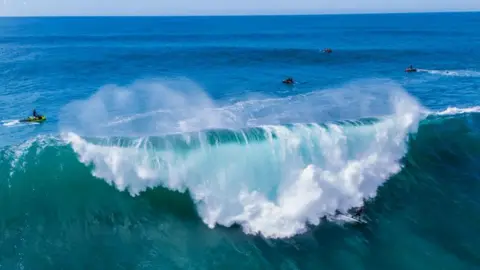 Getty Photographs
Getty PhotographsA ground-breaking undertaking to suck carbon out of the ocean has began working on England’s south coast.
The miniature pilot scheme, referred to as SeaCURE, is funded by means of the United Kingdom govt as a part of its seek for applied sciences that struggle environment exchange.
There’s vast consensus amongst environment scientists that the overpowering precedence is to scale down greenhouse fuel emissions, the leading motive of worldwide warming.
However many scientists additionally imagine that a part of the answer must contain taking pictures one of the gases that experience already been excepted.
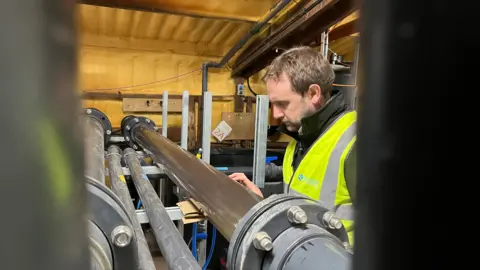
Those initiatives, referred to as carbon seize, in most cases center of attention both on taking pictures emissions at supply or pulling them from the wind.
What makes SeaCure fascinating is that it’s trying out whether or not it could be extra environment friendly to drag planet-warming carbon from the ocean, since it’s found in higher concentrations in aqua than within the wind.
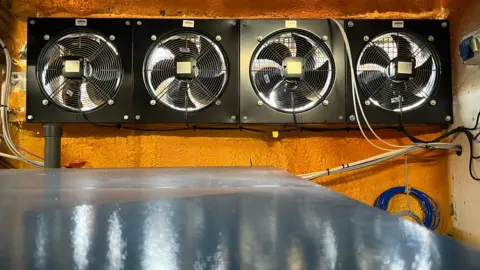
To achieve the undertaking’s front it’s a must to walk around the again of the Weymouth Sealife Centre and progress era an indication that claims “Caution: Moray Eels may Bite”.
There’s a explanation why this ground-breaking undertaking has been positioned right here.
It’s a pipe that snakes underneath the stony seaside and out into the English Channel, sucking up seawater and bringing it onshore.
The undertaking is attempting to search out whether or not taking away carbon from the aqua could be a value efficient manner of lowering the quantity of the environment warming fuel CO2 within the environment.
SeaCURE processes the seawater to take away the carbon ahead of pumping it again out to sea the place it absorbs extra CO2.
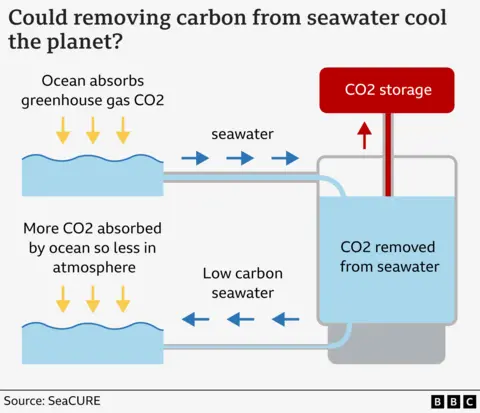
We’re the primary broadcast reporters to discuss with and Trainer Tom Bell from Plymouth Marine Laboratory is tasked with appearing us round.
He explains that the method starts by means of treating one of the seawater to create it extra acidic. This encourages the carbon that’s dissolved within the seawater to grow to be a fuel and be excepted into the environment as CO2.
“This is the seawater stripper” Prof Bell says with a grin as we flip a nook.
The “stripper” is a immense stainless-steel tank which maximises the quantity of touch between the acidic seawater and the wind.
“When you open a fizzy drink it froths, that’s the CO2 coming out.” Prof Bell says. “What we’re doing by spreading the seawater on a large surface area. It’s a bit like pouring a drink on the floor and allowing the CO2 to come out of the seawater really quickly.”
The CO2 that emerges into the wind is sucked away and next concentrated the use of charred coconut husks in a position to be saved.
The low-carbon seawater next has alkali added to it – to neutralise the acid that was once added – and is next pumped again out right into a tide that flows into the ocean.
As soon as again within the sea it straight away begins to soak up extra CO2 from the environment contributing in an excessively miniature strategy to lowering greenhouse gases.
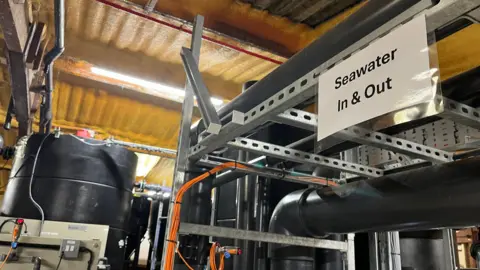
There are already a lot more evolved carbon seize applied sciences which rush carbon without delay out of the wind – however Dr Paul Halloran who leads the SeaCURE undertaking tells me that the use of aqua in lieu has its benefits.
“Seawater has got loads of carbon in it compared to the air, about 150 times more,” says Dr Halloran.
“But it has got different challenges, the energy requirements to generate the products that we require to do this from seawater are huge.”
At this time the quantity of CO2 this pilot undertaking is taking away is little – at maximum 100 metric tonnes in keeping with generation – that’s much less CO2 than a business airplane emits crossing the Atlantic. However given the dimensions of the sector’s oceans the ones in the back of SeaCURE assume it transformational action.
In its submission to the United Kingdom govt SeaCURE stated the era had the possible to be vastly scaled up to take away 14 billion tonnes of CO2 a generation if 1% of the sector’s seawater at the ocean’s floor was once processed.
For that to be believable all the procedure for stripping the carbon – would need to be powered by means of renewable power. In all probability by means of sun panels in a floating set up at sea.
“Carbon removal is necessary. If you want to reach net zero emissions and net zero emissions is needed to halt further warming,” says Dr Oliver Geden who’s a part of the Intergovernmental Panel on Surrounding Exchange and a professional in carbon seize.
“Capturing directly from seawater is one of the options. Directly capturing it from the air is another one. There are basically 15 to 20 options, and in the end the question of what to use, of course, will depend on the cost.”
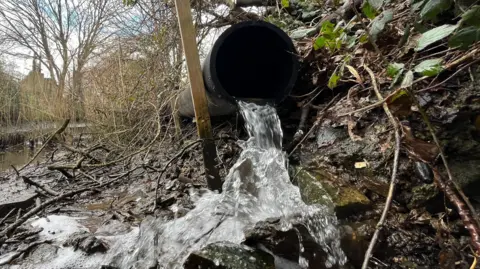
The Seacure undertaking has £3m of investment from the federal government and is one in every of 15 pilot initiatives being subsidized in the United Kingdom as a part of efforts to create applied sciences that seize and collect greenhouse gases.
“Removing greenhouse gases from the atmosphere is essential in helping us achieve net zero,” says power minister Kerry McCarthy. “Innovative projects like SeaCURE at the University of Exeter play an important role in creating the green technologies needed to make this happen, while supporting skilled jobs and boosting growth.”
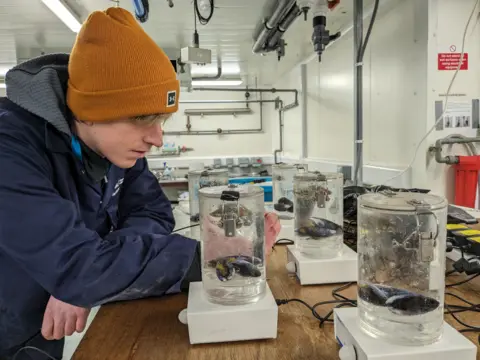 College of Exeter
College of Exeter‘Some affect on order’
There’s additionally the query of what a immense batch of low-carbon aqua would do to the ocean and the issues that are living in it. In Weymouth it dribbles out of a pipe in such miniature amounts it’s not likely to have any affect.
Man Hooper is a PhD scholar at Exeter College and is researching the imaginable affects of the undertaking. He’s been exposing marine creatures to low-carbon aqua underneath laboratory statuses.
“Marine organisms rely on carbon to do certain things,” he says. “So phytoplankton use carbon to photosynthesize while things like mussels also use carbon to build their shells.”
Hooper says early indications are that vastly expanding the quantity of low-carbon aqua may have some affect at the order.
“It might be damaging but there might be ways to mitigate that – for example through pre-diluting the low-carbon water. It’s important this is included in the discussion early on.”


